By Craig Choy
After reading certain recent press articles, one would be forgiven for wondering if one had schizophrenia.
In a recent article, conservative columnist Christine Wat Wing-yin (屈穎妍) accused the legal aid system of working to enrich senior counsel Philip Dykes and other barristers. Around the same time, another article referred to the dramatic decline in income of foreign counsel after the handover – with one of the interviewees being Dykes. So which is it: has Dykes been fattened up or has he had to tighten his belt?

Wat’s article contains numerous errors of fact, which lead to misleading and ungrounded conclusions.
First, relatively few barristers and solicitors specialise in judicial review. Wat questioned how grassroots applicants of limited education (such as elderly Lo Siu-lan, who challenged the Link REIT, and public estate resident Chu Yee-wah, who brought legal action against the Hong Kong-Zhuhai-Macau Bridge) could seek out Dykes to represent them.
However, media reports of important cases now frequently refer to the legal representatives of both sides; further information about them is only a few mouse clicks away. Thus, for instance, would it be surprising if Kwok Cheuk-kin (a pensioner who is nicknamed the “king of judicial review”) was acquainted with the lawyers referred to by Ms Wat?
Second, under Hong Kong’s legal system, a citizen who wishes to litigate would usually engage a solicitor, who will then engage a barrister to appear in court. The solicitors representing Lo Siu-lan and Chu Yee-wah were highly experienced; would it be difficult for them to know which barristers are experts in human rights or judicial review?

Third, judicial review cases often involve policies with society-wide impact, such as whether prisoners have the right to vote, or whether secondary school places should be assigned by sex. Both applicant and the government alike often need to retain specialists to consider the constitutionality of the laws and policies at issue. As a result, the government itself also frequently turns to the same handful of barristers for judicial review cases.
Fourth, legal aid cases are not profitable for lawyers. Legal aid is paid for using public funds. It is widely known within the legal profession that both barristers and solicitors typically receive 30-40 per cent less on legal aid cases than they do on other cases. The amount that solicitors can earn on legal aid cases is trivial compared to what they could earn on an IPO.
In addition, the small number of judicial review cases (particularly compared to criminal cases) would not be enough to sustain – let alone “enrich” – barristers and solicitors who specialise in judicial review.
Fifth, the Director of Legal Aid is empowered under the Legal Aid Ordinance to appoint independent counsel to determine if a legal aid application involving judicial review has a reasonable prospect of success. In May 2017, Under-Secretary for Home Affairs Florence Hui Hiu-fai cited the following statistics in the Legislative Council:

Thus, over the past five years, only a fifth of applications for legal aid in judicial review proceedings have been approved. Those approved applications are considered by the Director of Legal Aid to have a reasonable chance of success. If there are just and reasonable grounds for a judicial review, why not let it proceed?
As Chief Justice Geoffrey Ma declared at the ceremonial opening of the 2016 legal year: “In the important area of public law, legal aid has played its part in ensuring that Hong Kong’s public law and constitutional law have properly developed, thus helping us to reach a greater understanding of our system of law.” At this year’s ceremonial opening, Chief Justice Ma added that judicial review cases “enable the community to see the rule of law at work and to test the confidence which the public will have in the rule of law.”
From Wat’s article, it is apparent that a trend, or perhaps an undercurrent, has emerged in Hong Kong – of commentators whose relentless attacks on the legal aid system display breathtaking creativity and imagination. They have now moved from attacking applicants for “abuse” to direct attacks on the legal professionals representing them.
Hong Kong people who continue to trust and defend Hong Kong’s judicial system should remain vigilant in the face of these developments.
Craig Choy is a convener of the Progressive Lawyers Group. He is an in-house lawyer specialising in data protection law. He is also an Internet freedom advocate.
